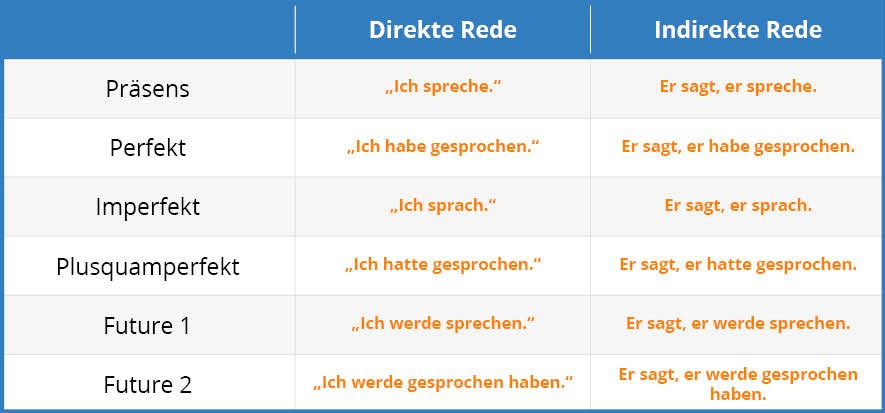German Indirect Speech
Die Indirekte Rede im Deutschen – Erklärungen und Beispiele
German Indirect Speech – Summary
Zusammenfassung
In indirect speech, things people have said are reproduced. Often, the indirect speech is put into a subordinate clause which is introduced by “dass“. In this case the verb is put in its subjunctive form. In some cases, depending on every-day language or the probability of the message, the indicative form of the verb is used. Let’s compare direct and indirect speech.
Direct Speech:
- „Ihnen, liebe Wähler danke ich herzlich.“
- „Wir alle können stolz sein auf den errungenen Erfolg.“
Indirect Speech with “dass”:
- “Der Politiker sagte, dass er seinen Wählern herzlich danke, sie alle auf den errungenen Erfolg stolz sein könnten, und dieser das Ergebnis ihrer gemeinsamen Arbeit sei.”
Indirect Speech without “dass”:
- “Der Politiker sagte, er danke seinen Wählern herzlich.”
- “Die Frau erzählte, dass sie in Wien wohne.”
Direct question can also be transformed into indirect questions. They are normally introduced by the word “ob” or by another question word. Have a look at the following example:
- „Gehst du morgen zur Wahl?“
Transformation to indirect question:
- “Er fragte mich, ob ich morgen zur Wahl ginge.”
Welcome to language-easy.org! Well, as you have clicked on this article, I suppose that you are ready to enter the depth of German grammar. So, the topic of this article is the German indirect speech. Of course, most of you have heard about that topic, as it also exists in the English language. Unfortunately, the German indirect speech is slightly different to the English one. Nevertheless, you will see that this topic is not too complicated either.
In the following, I’d like to structure this article in a first definition of the German indirect speech and also give some explanation and examples of its usage. After that, we will have a more detailed look on the use of the German indirect speech in different grammatical structure. Finally, we will have to talk about the subjunctive mood. Well, as in the English language, the subjunctive is also a necessary mood always connected with the German indirect speech.
And now, let’s not lose too much time and come straight to the first point of this article, a definition and the correct usage of the German indirect speech. Los geht’s!
Definition and Usage of German Indirect Speech
Definition und Anwendung indirekten Rede im Deutschen
Well, first of all we should clear up what the German indirect speech actually is. So, keep in mind the following short definition of the German indirect speech.
The German indirect speech allows to report what someone has said without repeating their exact words.
Sometimes, the German indirect speech is also called reported speech and in German “indirekte Rede”. So, The German indirect speech can be found in newspapers or every medium, where something is reported and reproduced what a third person has said.
Well, another important fact about German indirect speech is that it is often introduced by certain Phrases. So, examples for these phrases are the following verbs: “sagen”, “meinen”, “behaupten”, “erklären”, “fragen”, “berichten”, …
Now, let’s come to the next point of this article – the conversion of direct speech into German indirect speech.
The Conversion of Direct in to Indirect German Speech
Die Umwandlung der direkten in indirekt Rede im Deutschen
Well, in case you want to convert the direct into German indirect speech, you should consider three important factors. So, in the following, I’d like to list them.
- First, the change of verb form:
“Er hat Fussball gespielt.” – “Er sagte, er habe Fussball gespielt” - Second, the change of pronouns:
“Er sagte: Ich habe Oliver Kahn gesehen!” – “Er sagte, er habe Oliver Kahn gesehen.” - Third, if neccessary, the change of details about place and time:
“Er sagte, Philip war gestern hier.” – “Er sagte, Philip sei am Tag zuvor da gewesen.”
So, as we have cleared up the conversion of direct into German indirect speech, let’s come to some grammatical structure where the German indirect speech is of high importance.
Further Usage of German Indirect Speech
Weitere Anwendungen der indirekten Rede im Deutschen
So, in the following, I’d like to talk shortly about three other grammatical structures, where the German indirect speech is of high importance.
Declarative Sentences
As a first grammatical structure where the German indirect speech can be found, we can name the declarative sentences. you easily convert this kind of sentence into German indirect speech just by adding “dass” to the introductory clause.
“Ich habe Philip gesehen.” – “Er sagt, dass er Philip gesehen habe.”
Question Sentences
So, question sentences also include the German indirect speech. Well, you can simply introduce it by using the question word.
“Er fragte: Wo is Philip?” – “Er fragte, wo Philip sei.”
Demand and Requests
Finally, we have to mention the demands and requests, where usually modal verb “sollen” is used. In case you’d like to sound more polite, just use the verb “mögen”.
“Er sagte: Philip, sei nicht so laut!” – “Er sagte, Philip solle nich so laut sein.”
Indicative or Subjunctive?
Indikativ oder Konjunktiv?
Finally, we have reached the last topic of this article about indirect speech. Well, in order to use the indirect speech, we can use the indicative or the subjunctive mood. So, whether to use one of these moods, depends on the context: Whereas the indicative is mostly used in spoken language, German use the subjunctive mainly in written language.
- So, if we use the indicative, we can assume that we believe and/or agree with the original speaker.
“Philip sagt, dass er dick ist.” – “Philip sagt, er ist dick.” - If we use the subjunctive, it’s clear that we are simply repeating what the original speaker said (whether we believe him/her or not). In this way, the subjunctive is a neutral form. So, that’s why indirect speech in radio reports and newspaper articles is always presented in the subjunctive.
“Philip sagt, dass er dick sei.” – “Walter sagt, er sei dick.”
The Usage of Tenses in German Indirect Speech
Die Verwendung der Zeiten in der indirekten Rede im Deutschen
Now, we come to an essential topic in this article about the German indirect speech. Here, I’d like to give you a short overview about the correct usage of the different tenses in the indirect speech. Well, you will see that we actually use the subjunctive 1 forms, unless these forms are identical to the indicative.

Please, try to keep this table in mind as a useful guide for the correct usage of tenses in German indirect speech.
Exercises
Übungen
Finally, we have reached the last part of this article where you can prove the German skills you have just learned. In the following you will see some phrases that you should complete with the correct terms. Once you have filled all the gaps, just click on the “correct” button and you can see your errors and the correct results. Good luck and… auf Wiedersehen!



